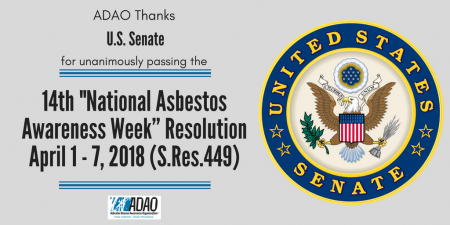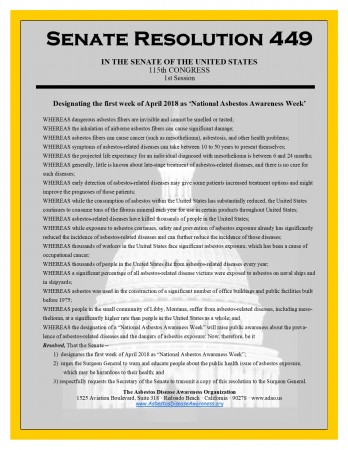Posted on March 23, 2018
ADAO Applauds the U.S. Senate for Passing the Fourteenth Resolution (S.Res.449) Designating April 1-7 “National Asbestos Awareness Week”
March 23, 2018 01:42 PM Eastern Daylight Time
 WASHINGTON– The Asbestos Disease Awareness Organization (ADAO), an independent nonprofit dedicated to preventing asbestos exposure through education, advocacy, and community work; today praised the Senate for passing the 14th Resolution establishing “National Asbestos Awareness Week.” S. Res. 449. Led by Senator Jon Tester (D-MT) and original bipartisan cosponsors Senators Steve Daines (R-MT), Ben Cardin (D-MD), Dick Durbin (D-IL), Dianne Feinstein (D-RI), Sheldon Whitehouse (D-RI), Kamala Harris (D-CA), Patrick Leahy (D-VT), Jeff Merkley (D-OR), Cory Booker (D-NJ), Edward Markey (D-MA), Johnny Isakson (R-GA), and Elizabeth Warren (D-MA), the resolution seeks to “raise public awareness about the prevalence of asbestos-related diseases and the dangers of asbestos exposure,” underscoring ADAO’s important mission.
WASHINGTON– The Asbestos Disease Awareness Organization (ADAO), an independent nonprofit dedicated to preventing asbestos exposure through education, advocacy, and community work; today praised the Senate for passing the 14th Resolution establishing “National Asbestos Awareness Week.” S. Res. 449. Led by Senator Jon Tester (D-MT) and original bipartisan cosponsors Senators Steve Daines (R-MT), Ben Cardin (D-MD), Dick Durbin (D-IL), Dianne Feinstein (D-RI), Sheldon Whitehouse (D-RI), Kamala Harris (D-CA), Patrick Leahy (D-VT), Jeff Merkley (D-OR), Cory Booker (D-NJ), Edward Markey (D-MA), Johnny Isakson (R-GA), and Elizabeth Warren (D-MA), the resolution seeks to “raise public awareness about the prevalence of asbestos-related diseases and the dangers of asbestos exposure,” underscoring ADAO’s important mission.
“Too many folks have suffered or lost their lives to asbestos-related illness,” said Senator Tester. “In Libby and Troy, we have seen firsthand the devastation that asbestos can cause in a community. By making education and awareness a priority, we can protect our families from this silent killer.”
“We are enormously thankful to the Senate, and especially Senator Tester and the 12 cosponsors, for the passage of the resolution implementing the 14th ‘National Asbestos Awareness Week’,” stated ADAO President Linda Reinstein. “Each year, up to 15,000 Americans die from preventable asbestos-caused diseases while imports and use continue. Undoubtedly, the resolution’s momentum and U.S. Surgeon General’s asbestos warning will raise awareness and save lives.”
 New data from the Centers for Disease Control and Prevention (CDC) reports that asbestos-caused deaths are on the rise in the U.S., despite significantly decreased use since peak consumption in the 1970s. Furthermore, the study reports that malignant mesothelioma deaths among patients aged 25-44 continue, indicating current and continued occupational, environmental, and secondary exposure risk. Asbestos has even been found recently in makeup and other consumer products; its import and usage continue.
New data from the Centers for Disease Control and Prevention (CDC) reports that asbestos-caused deaths are on the rise in the U.S., despite significantly decreased use since peak consumption in the 1970s. Furthermore, the study reports that malignant mesothelioma deaths among patients aged 25-44 continue, indicating current and continued occupational, environmental, and secondary exposure risk. Asbestos has even been found recently in makeup and other consumer products; its import and usage continue.
Reinstein continued, “As the EPA begins its risk evaluation of asbestos under the Toxic Substances Control Act (TSCA), today’s passage underscores what we’ve long known about asbestos — that it poses undue risk to human health and the environment and must be banned, as there is no safe or controlled use. This has been the sentiment of the last 13 Senate Asbestos Awareness Resolutions as well as five warnings from the U.S. Surgeon General’s office; and former President Barack Obama became the first sitting president to acknowledge asbestos as a deadly carcinogen.”
During Asbestos Awareness Week, ADAO will feature multilingual educational materials and videos. ADAO will also hold its 14th Annual International Asbestos Awareness and Prevention Conference “Where Knowledge and Action Unite,” April 13-15, 2018 at the Renaissance Arlington Capital View Marriott in Arlington, VA, just outside of Washington, D.C. Global experts will speak on the latest advancements in asbestos disease prevention, treatment for mesothelioma and other asbestos-caused diseases, and global asbestos ban advocacy.
Exposure to asbestos, a human carcinogen, can cause mesothelioma, lung, gastrointestinal, colorectal, laryngeal, and ovarian cancers; as well as non-malignant lung and pleural disorders. The Global Burden of Disease, Injuries, and Risk Factor Study of 2013 published in the renowned Lancet Medical Journal reported that 194,000 people globally die from asbestos-caused diseases every year, equaling more than 500 deaths per day.
###
About the Asbestos Disease Awareness Organization
The Asbestos Disease Awareness Organization (ADAO) was founded by asbestos victims and their families in 2004. ADAO is the largest non-profit in the U.S. dedicated to providing asbestos victims and concerned citizens with a united voice through our education, advocacy, and community initiatives. ADAO seeks to raise public awareness about the dangers of asbestos exposure, advocate for an asbestos ban, and protect asbestos victims’ civil rights. For more information, visit www.asbestosdiseaseawareness.org.
Contacts
Asbestos Disease Awareness Organization (ADAO)
Kim Cecchini, 202-391-5205
kim@asbestosdiseaseawareness.org
